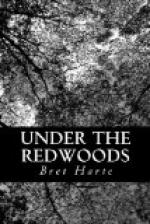Then the fire dropped out of his eyes as he turned with his usual stolidity to where Li Tee was lying. Him he shook, saying briefly: “Boston boy come back!” But there was no reply, the dead body rolled over inertly under his hand; the head fell back, and the jaw dropped under the pinched yellow face. The Indian gazed at him slowly, and then gravely turned again in the direction of the voice. Yet his dull mind was perplexed, for, blended with that voice were other sounds like the tread of clumsily stealthy feet. But again the voice called “Jim!” and raising his hands to his lips he gave a low whoop in reply. This was followed by silence, when suddenly he heard the voice—the boy’s voice—once again, this time very near him, saying eagerly:—
“There he is!”
Then the Indian knew all. His face, however, did not change as he took up his gun, and a man stepped out of the thicket into the trail:—
“Drop that gun, you d——d Injin.”
The Indian did not move.
“Drop it, I say!”
The Indian remained erect and motionless.
A rifle shot broke from the thicket. At first it seemed to have missed the Indian, and the man who had spoken cocked his own rifle. But the next moment the tall figure of Jim collapsed where he stood into a mere blanketed heap.
The man who had fired the shot walked towards the heap with the easy air of a conqueror. But suddenly there arose before him an awful phantom, the incarnation of savagery—a creature of blazing eyeballs, flashing tusks, and hot carnivorous breath. He had barely time to cry out “A wolf!” before its jaws met in his throat, and they rolled together on the ground.
But it was no wolf—as a second shot proved—only Jim’s slinking dog; the only one of the outcasts who at that supreme moment had gone back to his original nature.




